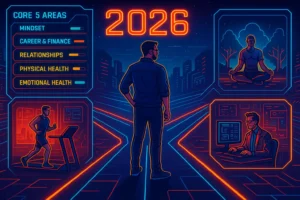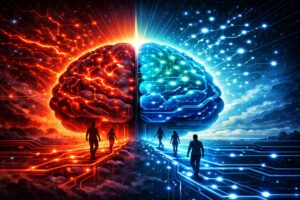Picture this: You’re faced with a complex problem at work that nobody on your team has encountered before. Do you feel your stomach drop with dread, or do you feel a spark of excitement thinking, “This is going to be interesting”? That split-second reaction reveals whether you’ve cultivated what might be your most valuable asset—a learning mindset.
A learning mindset isn’t about cramming more information into your head or becoming the smartest person in the room. It’s about transforming your relationship with the unknown, turning confusion into curiosity, and finding genuine excitement in the process of figuring things out.
This philosophy aligns perfectly with what I call the “Equation of Life”:
Your Belief System + Your Repeated Actions + Time = Who You Will Become
When you develop a learning mindset, your belief system revolves around the conviction that every puzzle contains hidden treasures of wisdom. Your repeated actions involve consistently exploring, experimenting, and extracting insights from daily experiences. Over time, this transforms you into someone who sees opportunity where others see impossibility.
Contrast this with a knowledge-hoarding mindset, where you might cling to what you already know, avoid admitting ignorance, and miss the incredible growth that comes from embracing uncertainty.
Ready to turn your natural curiosity into a systematic advantage that accelerates success in every area of life? Let’s dive into the art and science of cultivating a learner’s mindset.
What You’ll Discover in This Guide
- A proven framework for transforming everyday experiences into powerful learning opportunities.
- Science-backed techniques to overcome the mental blocks that kill curiosity and limit exploration.
- Practical systems to make knowledge acquisition feel as natural and enjoyable as your favorite hobby.
Learner’s Mindset Definition:
A learning mindset is a mental orientation that views every interaction, challenge, and experience as a potential source of valuable insights. People who embody a learner’s mindset approach uncertainty with excitement rather than anxiety, treating the unknown as an adventure playground rather than a danger zone.
Learning Mindset vs Growth Mindset
These two powerful concepts work together but focus on different aspects of development:
- A growth mindset centers on the belief that your capabilities expand through dedication and strategic effort.
- A learning mindset drives the active hunt for knowledge, experiences, and insights that fuel that expansion.
Think of them as dance partners: if growth mindset provides the rhythm (“I can get better”), learning mindset provides the movement (“Let me explore how”).
Read More: Growth Mindset Activities for Kids
Why Your Brain Craves Learning (When You Let It)
Modern neuroscience reveals something remarkable: your brain is literally designed to reward learning. When you discover something new or make an unexpected connection, your neural networks release a cocktail of feel-good chemicals including dopamine, norepinephrine, and acetylcholine.
This neurochemical reward system explains why children can spend hours absorbed in exploration without any external motivation. They haven’t yet learned to fear looking foolish or making mistakes—they’re operating purely on the brain’s natural learning reward system.
Research from leading neuroscience labs shows that people who maintain active learning habits demonstrate:
- Enhanced cognitive flexibility and creative problem-solving
- Greater emotional resilience during major life transitions
- Improved ability to spot patterns and opportunities others miss
- Stronger social connections through shared discovery experiences
The compound benefits are extraordinary: each insight you gain creates neural pathways that make future learning exponentially faster and more intuitive.
Essential Components of a Learner’s Mindset
Developing a learning mindset requires cultivating specific mental habits that transform ordinary moments into discovery opportunities. Here are the core elements that distinguish true learners:
1. Sacred Curiosity About Everything
True learners maintain an almost reverent sense of wonder about how the world works. They ask penetrating questions about mundane topics, probe beneath surface explanations, and find fascinating complexity in seemingly simple situations.
2. Embracing the Beautiful Struggle of Not Knowing
Instead of rushing to appear competent, they find genuine comfort in confusion and uncertainty. They understand that the discomfort of not knowing is the price of admission to breakthrough understanding.
3. Mastering the Art of Strategic Inquiry
They’ve developed sophisticated questioning skills that unlock deeper layers of understanding. Rather than asking random questions, they know which inquiries reveal underlying structures and universal principles.
Read More: 5 Reasons You Feel Lost in Life
4. Hunting for Contrarian Perspectives
A learner’s mindset actively seeks out viewpoints that challenge comfortable assumptions. They understand that the most valuable insights often come from engaging with ideas that initially seem wrong or threatening.
5. Mining Gold from Failures and Setbacks
Mistakes become treasure troves of information rather than sources of embarrassment. They approach failures with the excitement of an archaeologist uncovering ancient artifacts—each error reveals something valuable about reality.
6. Weaving Knowledge Across Boundaries
They excel at discovering patterns and principles that transcend specific domains. A lesson from parenting might illuminate team leadership; insights from cooking could transform project management approaches.
7. Sharing to Multiply Understanding
They recognize that teaching amplifies learning exponentially. By explaining concepts to others, they discover gaps in their own understanding while helping build a community of fellow explorers.
Real-World Learning Mindset Champions
Here’s how developing a learning mindset transforms different life scenarios:
The Industry Disruptor: A traditional banker discovers cryptocurrency through pure curiosity about digital trends. Instead of dismissing it as a fad, she spends months learning about blockchain technology, attending conferences, and interviewing tech entrepreneurs. This learning journey positions her to lead her company’s digital transformation initiative three years later.
The Relationship Explorer: A father struggling to connect with his teenage daughter develops a learner’s mindset about her generation. He explores social media platforms, studies adolescent psychology, and even learns to play her favorite video games. This curiosity-driven approach transforms their relationship and makes him a more effective parent.
The Creative Synthesizer: A graphic designer becomes fascinated with cognitive psychology and behavioral economics. By learning how people process information and make decisions, she creates more effective designs that actually influence user behavior, dramatically increasing her professional value.
The Adaptive Entrepreneur: A restaurant owner facing pandemic challenges develops a learning mindset about digital marketing, food delivery systems, and community building. Her willingness to explore unfamiliar territory helps her not just survive but thrive by creating new revenue streams.
10 Powerful Strategies for Cultivating a Learning Mindset
1. Practice the Art of Intelligent Ignorance
Deliberately choose one area each week where you’ll admit complete ignorance and explore it with fresh eyes. This might mean studying a field you’ve always avoided, asking naive questions to experts, or approaching familiar problems as if you’ve never encountered them before.
Weekly challenge: Pick a topic you typically dismiss or avoid. Spend 30 minutes exploring it with genuine openness, focusing on understanding rather than judging.
2. Build Knowledge Connections Across Domains
Actively look for patterns and principles that apply across different areas of life. When you learn something new, ask yourself: “Where else might this principle apply?” This cross-domain thinking leads to breakthrough insights and innovative solutions.
Connection exercise: Each time you learn something new, identify three completely different areas where the same principle might be useful.
3. Develop a Personal Learning Laboratory
Create structured experiments to test ideas and hypotheses in your own life. Instead of just reading about concepts, design small-scale trials to see how principles work in your specific context and circumstances.
Monthly experiment: Choose one evidence-based strategy from any field and test it in your life for 30 days, carefully documenting what works, what doesn’t, and why.
4. Cultivate Strategic Confusion
Instead of immediately seeking answers when confused, spend time exploring the confusion itself. Ask: “What assumptions am I making? What don’t I understand about my lack of understanding?” This meta-cognitive approach often reveals insights that direct answers miss.
Confusion protocol: When you encounter something confusing, spend 10 minutes exploring your confusion before seeking explanations.
5. Build a Learning Advisory Board
Surround yourself with people who think differently than you do. This includes mentors who challenge your assumptions, peers exploring similar questions from different angles, and people from completely different backgrounds who offer fresh perspectives.
Network diversification: Identify the 3-5 people who most influence your thinking. Ensure they represent diverse backgrounds, industries, and viewpoints.
6. Practice Intellectual Humility
Regularly examine and question your own beliefs and assumptions. Approach your strongest convictions with the same curiosity you’d bring to foreign concepts. This intellectual humility creates space for learning and prevents cognitive rigidity.
Belief audit: Monthly, choose one strong belief you hold and spend time understanding the best arguments against it.
7. Create Learning Rituals That Stick
Design specific routines that prioritize exploration and discovery. This might involve morning reading sessions that expose you to new ideas, evening reflection periods that extract lessons from the day, or weekend adventures into unfamiliar territories.
Learning ritual examples:
- “Random Wednesday”: Explore something completely unrelated to your work every Wednesday
- “Question Friday”: End each week by identifying the most intriguing question you encountered
- “Connection Sunday”: Spend time linking ideas from different areas of your life
8. Develop Pattern Recognition Skills
Train yourself to notice recurring themes, structures, and dynamics across different contexts. This pattern recognition ability helps you extract maximum learning from every experience and apply insights more broadly.
Pattern practice: Keep a weekly log of patterns you notice in conversations, problems, solutions, and behaviors.
9. Transform Social Interactions into Learning Opportunities
Approach every conversation with genuine curiosity about the other person’s perspective and experience. Instead of waiting for your turn to speak, focus on discovering something unexpected about how they see the world.
Conversation goal: In every significant conversation, aim to learn something that surprises you about the other person’s viewpoint or experience.
10. Leverage Technology for Accelerated Discovery
Use digital tools to amplify your natural learning processes. This includes apps that connect you with diverse learners, platforms that recommend content based on your curiosity patterns, and systems that help you track and reflect on your intellectual journey.
Digital learning ecosystem:
- Curate diverse information sources that challenge your thinking
- Join online communities focused on exploration rather than expertise
- Use tracking tools to identify patterns in your learning preferences
- Set up automated systems that expose you to new ideas regularly
Read More: 7 AI-Powered Digital Habits to Turn Screen Time Into Growth
The Compound Power of Intellectual Cross-Training
One of the most transformative aspects of developing a learning mindset is discovering how insights from one area enhance understanding in completely different domains. This intellectual cross-training creates exponential rather than linear growth.
Consider how studying music theory might illuminate mathematical concepts, how understanding ecosystems could transform your approach to team dynamics, or how learning about persuasion techniques might improve your parenting skills. These connections aren’t coincidental—they reflect underlying patterns that govern how systems work across all areas of life.
Navigating Learning Obstacles
As you cultivate a learner’s mindset, you’ll encounter predictable challenges. Here’s how to address the most common barriers:
Impostor syndrome: Remember that feeling like a beginner is the natural state of someone who’s growing. The discomfort means you’re pushing boundaries, not that you’re inadequate.
Analysis paralysis: Set specific time limits for exploration. Sometimes the best learning comes from taking action based on incomplete information and then adjusting based on results.
Social pressure to appear expert: Find communities that celebrate learning over knowing. Surround yourself with people who reward curiosity and growth rather than performance and perfection.
Fear of changing your mind: Treat belief revision as a sign of intellectual strength, not weakness. The willingness to update your worldview based on new evidence is a superpower, not a flaw.
Making Learning Irresistibly Addictive
The secret to sustaining a learning mindset is making the process genuinely enjoyable rather than forcing yourself through willpower. When learning feels like play rather than work, consistency becomes effortless.
This involves designing your learning experiences to trigger natural reward systems: celebrating small discoveries, sharing insights with others, applying new knowledge immediately, and connecting learning to your deeper values and goals.
The most successful lifelong learners aren’t more disciplined—they’ve simply made learning so intrinsically rewarding that they crave intellectual growth the way others crave entertainment.
Conclusion – Learner’s Mindset
Developing a learning mindset fundamentally changes how you experience life. Instead of feeling threatened by rapid change and increasing complexity, you begin to see them as endless sources of fascinating puzzles to explore. This shift doesn’t just make you more successful—it makes existence itself more vivid and meaningful.
The ripple effects touch every aspect of your life. Professionally, curiosity drives innovation and adaptability. Personally, genuine interest in others deepens relationships and builds empathy. Intellectually, continuous learning keeps your mind sharp and flexible. Even spiritually, approaching life with wonder and humility opens you to experiences and insights that transform your understanding of what’s possible.
Remember that cultivating a learner’s mindset is itself a learning process. Be curious about your own development, patient with your progress, and excited about the journey of becoming someone who finds adventure in every challenge.
Turn Learning Into Your Most Rewarding Daily Practice
The key to making learning mindset development sustainable is building consistent habits that feel rewarding rather than burdensome. Our Weekly Habit Tracker App transforms this development process into an engaging journey where every moment of curiosity becomes a celebration.
Track your daily question-asking, reflection sessions, cross-domain connections, and experimental thinking. The app helps you see patterns in your learning preferences, celebrate intellectual breakthroughs, and maintain momentum even when progress feels slow.
OUR MISSION: To accelerate your growth in the 5 pillars of life by making your habit transformation journey so simple, fun, and rewarding that your momentum becomes inevitable. Start tracking your learning mindset development today, and watch as intellectual curiosity transforms every obstacle into an exciting opportunity for discovery!
FAQs About Developing a Learning Mindset
How Do You Start Building a Learning Mindset When You Feel Stuck?
Begin with micro-curiosity about your current situation. Instead of trying to learn entirely new subjects, start by asking deeper questions about things you encounter daily. What assumptions are you making about familiar situations? What would someone from a different background notice that you’re missing? This approach builds curiosity muscles without overwhelming your schedule.
What’s the Relationship Between Learning Mindset and Confidence?
A learning mindset actually builds deeper, more resilient confidence than trying to appear knowledgeable. When you’re comfortable with not knowing and excited about discovering, you become less defensive and more open to opportunities. This authentic confidence attracts others and creates better relationships because people sense your genuine interest in understanding rather than impressing.
Can a Learning Mindset Help with Career Transitions?
Absolutely. A learner’s mindset makes career transitions less scary and more strategic. Instead of seeing career changes as threats to your identity, you approach them as fascinating opportunities to explore new domains and discover unexpected connections between your past experience and future possibilities. This perspective helps you adapt faster and find unique value propositions.
How Does Technology Support Learning Mindset Development?
Technology amplifies learning mindset development by connecting you with diverse perspectives, providing access to expert knowledge, and helping you track patterns in your intellectual growth. However, the key is using technology strategically rather than passively consuming information. Focus on tools that encourage active exploration, critical thinking, and meaningful connections with other learners.
What Role Does Teaching Play in a Learning Mindset?
Teaching others is one of the most powerful learning accelerators because it forces you to organize your thoughts, identify knowledge gaps, and communicate complex ideas clearly. You don’t need formal teaching opportunities—explaining concepts to friends, mentoring colleagues, or creating content all serve this function. Teaching also builds community with fellow learners.
How Do You Maintain Learning Motivation During Difficult Periods?
During challenging times, shift your learning focus to understanding the difficulty itself. Become curious about how stress affects thinking, what coping strategies work best for your personality, and what the challenging period might teach you about resilience and adaptation. This approach maintains the learning mindset while actually helping you navigate difficulties more effectively.






